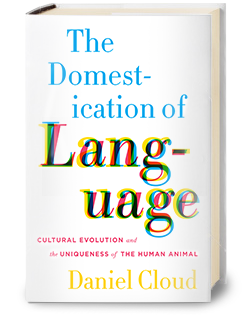Interviews
May 10, 2015
It seems that only twenty three words in the major language groups have remained without change for 15,000 years; they have managed to hang on while all the others have slipped away. Where do words come from—and where do they go? Evolution offers an answer, but also a further question: if evolution is random then are words too accidental? Princeton philosopher Daniel Cloud thinks it's a bit like breeding dogs.
Click here to hear the interview with Daniel Cloud, Ph.D. on ABC Australia 
January 2, 2015
For the American philosopher Daniel Cloud, artificial selection behind the evolution of languages, the meaning of words and vocabulary. In this interview with SEE site, Professor at Princeton University in the United States, reveals the functioning of this mechanism and account for that language makes us a single species in nature. – Translated from Portuguese
Click here to read the interview with Daniel Cloud, Ph.D. on VEJA.com
December 16, 2014
Why is human language and culture so astoundingly complex? In order to prosper in the so-called “era of evolutionary adaptation,” neither needed to have been complex at all. A Hominin with a smallish fraction of the symbolic and cultural abilities of Homo sapiens would easily have emerged (and maybe did emerge) as a completely dominant alpha predator. Imagine, if you will, a chimp that could talk a bit and produce reasonably effective missile weapons. How much selection pressure would such a talking, armed chimp face? Not much, at least from other animals. Such an Hominin would not, ceteris paribus, need to evolve new and more complex linguistic and cultural abilities and forms.
But complex linguistic and cultural abilities and forms did evolve. So, we have to ask, where do Shakespeare and Large Hadron Colliders come from? Daniel Cloud has an answer: domestication. In his fascinating and thought-provoking new book The Domestication of Language: Cultural Evolution and the Uniqueness of the Human Animal, Cloud argues that over the millennia proto-humans and humans have been selecting mates who were good with symbols and selecting symbols themselves. This process – a kind of runaway sexual selection and domestication – rapidly (in evolutionary time-scales) produced both a huge, expensive brain and an ornate culture to match.
Listen the interview with Daniel Cloud and Marshall Poe, NewbooksNetwork.com – New Books in Big Ideas.
December 6, 2014
We usually think of culture as something that evolves outside of our control, a mysterious force that influences us. By looking at the language we use to communicate, Daniel Cloud suggests the alternative: we actively create our culture, and have a responsibility to do it well.
Nikhil Sonnad sat down with Cloud to discuss these ideas and more. Read the full interview on QUARTZ.com

